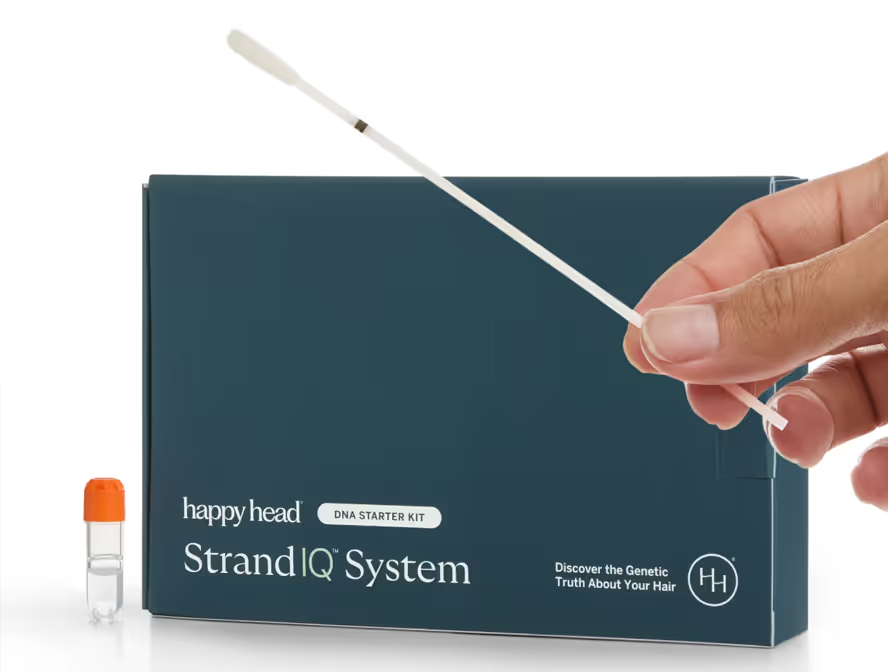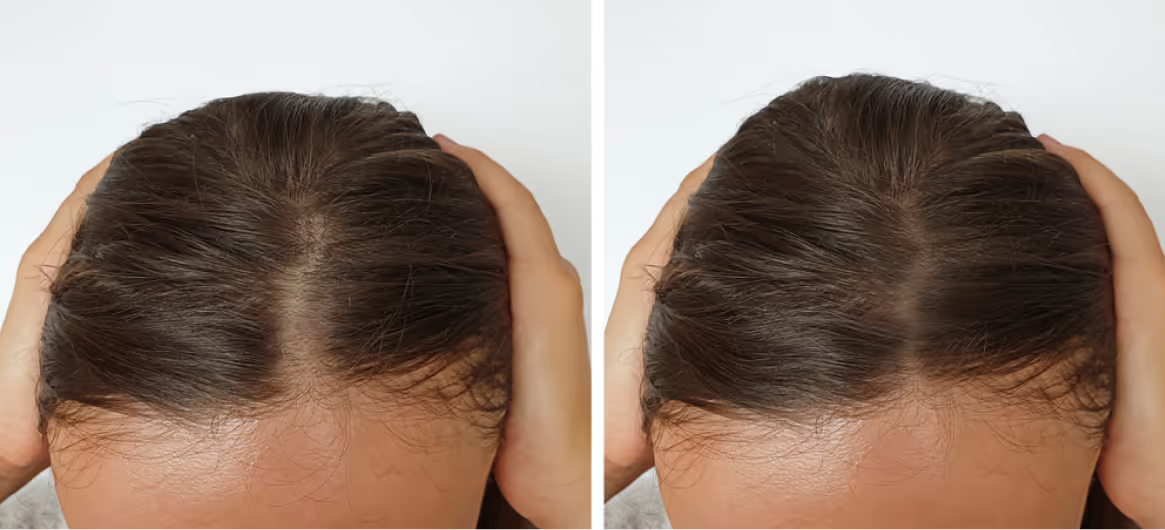Does finasteride affect fertility? In some men, finasteride can impact sperm quality and hormonal balance, potentially influencing fertility. However, these effects are typically uncommon and often reversible after stopping the medication.
Understanding how finasteride works and its possible effects on reproductive health can help men decide whether finasteride is right for them or if other hair loss treatments would be more beneficial, especially when planning to conceive.
How Oral Finasteride Works in the Body
Finasteride works by blocking the activity of type II 5-alpha-reductase, an enzyme that converts testosterone into dihydrotestosterone (DHT).
DHT is the primary hormone responsible for shrinking hair follicles in men with androgenetic alopecia, also known as male pattern baldness.
As DHT levels increase in the scalp, hair follicles become progressively smaller, producing thinner, shorter hairs over time until growth stops entirely. By inhibiting DHT production, finasteride helps reduce this follicle miniaturization.
With consistent daily use, finasteride can slow or stop further hair loss and may even encourage regrowth by allowing shrunken follicles to gradually recover.
However, results vary, and it may take 3–6 months of continuous use to see visible improvement. Hair gains are typically maintained only while treatment continues.
Propecia and Fertility Concerns
Propecia, a brand name for finasteride, may affect male fertility due to its impact on hormone regulation. By lowering DHT levels throughout the body, finasteride can influence tissues involved in sperm production and maturation.
DHT is involved in maintaining the normal function of the prostate and seminal vesicles, which contribute to seminal fluid volume and quality. In some men, reduced DHT may lead to decreased semen volume, lower sperm concentration, or changes in sperm motility.
Although these effects do not occur in everyone, they have been observed in some men taking Propecia.
Additionally, hormonal shifts triggered by finasteride may subtly alter the environment in which sperm develop. These potential changes are usually reversible after stopping the medication, but anyone concerned about fertility while using Propecia should consult a physician.
For those concerned about fertility, Happy Head offers personalized topical solutions that may have reduced systemic absorption. Topical applications deliver the medication directly to the scalp, potentially minimizing effects on other body systems.
Finasteride Effect on Sperm Quality
While finasteride is primarily used to treat hair loss, its influence on hormonal balance may affect sperm quality in some men. Understanding how it alters specific parameters such as sperm count, motility, and DNA integrity can help clarify its potential impact on fertility.
Changes in Sperm Count or Motility
Finasteride may reduce sperm count and motility by lowering DHT, a hormone that supports the function of accessory glands involved in semen production.
In some users, this hormonal shift can result in fewer or slower-moving sperm, which can make it more difficult to achieve conception. These effects are not universal but can occur, particularly with long-term use or in men who are more hormonally sensitive.
Fortunately, sperm parameters often return to normal within several months after discontinuing the medication, though recovery time may vary.
Impact on Sperm DNA and Health
It’s possible that finasteride can influence sperm DNA integrity, potentially increasing fragmentation or altering the biochemical environment in which sperm mature.
DHT helps to maintain the healthy function of the testes and epididymis, both of which are essential for producing viable, genetically stable sperm. When DHT levels are suppressed, this balance may be disrupted, potentially affecting sperm quality at the cellular level.
While these changes are usually reversible, they could still impact fertility during treatment. Men planning to conceive may benefit from sperm analysis or discussing alternative treatments with a dermatologist.
Is Fertility Loss Reversible After Stopping Finasteride?
In many cases, fertility changes associated with finasteride use are reversible after stopping the medication. Sperm count, motility, and overall semen quality often return to baseline within several months, though the timeline can vary from person to person.
The reversibility depends on individual factors such as age, treatment duration, and baseline reproductive health. Men concerned about fertility are typically advised to pause finasteride use and undergo a follow-up semen analysis to monitor for improvement over time.
Safety for Partners and Pregnancy
While finasteride is generally safe for the person taking it, special precautions should be taken to protect female partners—especially those who are pregnant or may become pregnant.
Finasteride can be absorbed through the skin, and even minimal exposure may pose a risk to a developing male fetus by interfering with normal genital formation. For this reason, pregnant women should avoid handling crushed or broken tablets.
In men taking oral finasteride, the amount excreted into semen is minimal, but direct exposure through contact is still considered a theoretical risk.
To ensure safety, always store tablets securely, avoid skin exposure, and consult a doctor if there are any concerns about partner or fetal health.
Finasteride and Sexual Side Effects
Finasteride may cause sexual side effects in some men due to its impact on hormone levels, particularly the reduction of DHT.
Reported side effects include decreased libido, difficulty achieving or maintaining an erection, and reduced ejaculate volume. These effects occur in a minority of users and are often mild and reversible after discontinuing the medication.
However, a small number of men may experience persistent symptoms even after stopping treatment.
The likelihood of experiencing sexual side effects varies based on individual sensitivity, dosage, and duration of use. Anyone noticing changes in sexual function should speak with their healthcare provider.
When To Talk to a Doctor About Finasteride and Fertility
If you’re taking finasteride and notice changes in sexual function, reduced ejaculate volume, or difficulty conceiving, it’s important to speak with a doctor. Professional guidance is especially important if you’re actively trying to start a family.
A doctor can evaluate your hormone levels, order semen analysis, and help determine whether finasteride may be contributing to fertility issues. They can also discuss alternative treatments or the expected timeline for recovery if discontinuation is recommended.
Since every man responds differently, personalized medical advice ensures the safest and most effective plan moving forward.
Alternatives to Oral Finasteride To Consider
For men concerned about finasteride’s effects on fertility or those seeking different options for hair loss, several effective alternatives exist.
These treatments may offer benefits with varying mechanisms of action and side effect profiles, allowing for more personalized hair restoration approaches.
Topical Finasteride
Topical finasteride delivers the active drug directly to the scalp, reducing systemic absorption and potentially lowering the risk of hormonal side effects.
It targets DHT locally to slow hair loss while minimizing impact on overall hormone levels, making it a promising option for men sensitive to oral finasteride.
Minoxidil
Minoxidil prescription is a medication that stimulates hair follicles by increasing blood flow and prolonging the growth phase of hair. It does not affect hormone levels and is often used alone or alongside other treatments to promote thicker, fuller hair without fertility concerns.
PRP Therapy
Platelet-rich plasma (PRP) therapy uses injections of a patient’s concentrated platelets to stimulate scalp healing and hair follicle regeneration.
This non-hormonal approach may improve hair density and quality, offering a natural alternative for those wary of medications affecting hormone balance.
Low-Level Laser Therapy
Low-level laser therapy (LLLT) uses specific light wavelengths to stimulate cellular activity within hair follicles. This painless, noninvasive treatment enhances blood circulation and hair growth without hormonal interference, making it a safe option for men focused on preserving fertility.
Other Factors That Affect Fertility in Men
Fertility in men is influenced by a wide range of factors beyond medication use.
Understanding these genetic, hormonal, lifestyle, environmental, and medical contributors is essential for a comprehensive approach to reproductive health and identifying potential causes of fertility challenges.
Genetic Factors
Genetic abnormalities can affect sperm production, quality, and function. Conditions such as chromosomal disorders, Y chromosome microdeletions, or inherited mutations may lead to low sperm count or defective sperm development.
These factors often require specialized testing to diagnose and can significantly impact a man’s ability to conceive naturally or with assisted reproductive technologies.
Hormonal Factors
Hormonal imbalances involving testosterone, follicle-stimulating hormone (FSH), luteinizing hormone (LH), or prolactin can disrupt sperm production and fertility.
Disorders affecting the hypothalamus, pituitary gland, or testes can alter hormone levels, impairing sperm development. Identifying and treating these imbalances is critical to restoring normal reproductive function.
Lifestyle Factors
Lifestyle choices such as smoking, excessive alcohol consumption, poor diet, stress, and lack of exercise can negatively affect sperm quality and fertility.
These factors contribute to oxidative stress and hormonal disruptions, which impair sperm count, motility, and morphology. Healthy habits improve overall reproductive health and increase the chances of conception.
Environmental Factors
Exposure to toxins, heavy metals, radiation, and endocrine-disrupting chemicals in the environment can damage sperm DNA and reduce fertility.
Occupational hazards, pollution, and even excessive heat from certain activities or clothing may harm sperm production. Minimizing exposure to harmful agents is important for maintaining optimal fertility.
Medical Factors
Medical conditions such as infections, varicocele, diabetes, obesity, and chronic illnesses can impair fertility by affecting sperm production or hormonal balance.
Proper diagnosis and management of these conditions are essential for improving fertility outcomes. Some treatments, including chemotherapy or surgeries, may also impact reproductive function.
Does Finasteride Affect Fertility? The Bottom Line
Finasteride can affect male fertility by altering sperm quality and hormonal balance in some men, but these effects are typically rare and often reversible after stopping treatment.
Men concerned about fertility should discuss risks with their healthcare provider to make informed decisions. Alternative treatments may be available for those sensitive to finasteride’s side effects.
Ultimately, finasteride’s impact on fertility varies individually, making professional guidance essential for safe and effective hair loss management.
Talk to a board-certified dermatologist to discuss your goals and find the solution that is best for you.
Frequently Asked Questions
Is finasteride safe while trying to conceive?
Finasteride may affect sperm quality in some men, which could potentially impact fertility. While not all men experience changes, it’s best to discuss finasteride use with a doctor if you’re actively trying to conceive or planning to try in the near future.
Can a man take finasteride while trying to conceive?
Some men continue finasteride while trying to conceive without issues, but others may experience reduced sperm count or motility. If fertility is a concern, it’s wise to consult a healthcare provider before continuing or starting treatment during this time.
Does finasteride affect sperm quality?
Finasteride may reduce sperm count, motility, or semen volume in certain men. These effects are often reversible after discontinuation, but they may impact fertility while taking the medication. Monitoring sperm health is important if you're concerned.
Does topical finasteride cause infertility?
Topical finasteride may result in lower systemic absorption than oral forms, potentially reducing the risk to fertility. However, some absorption still occurs, and effects can vary. If fertility is a priority, discuss the risks and benefits with your doctor.









